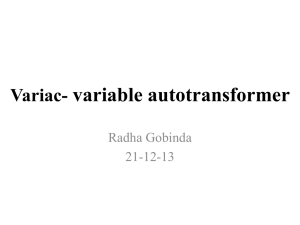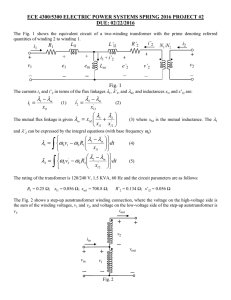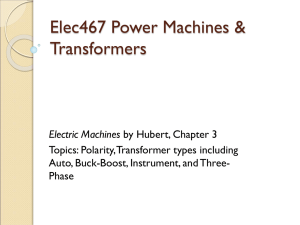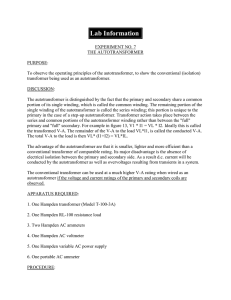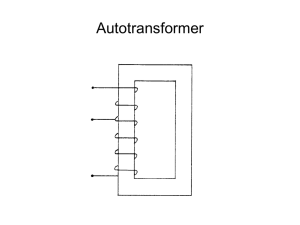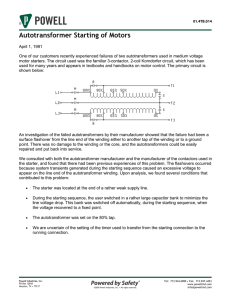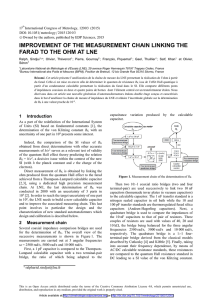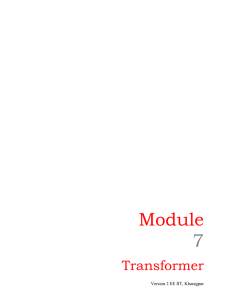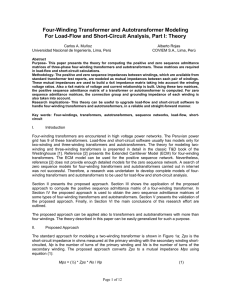EE 340 Power Transformers
advertisement
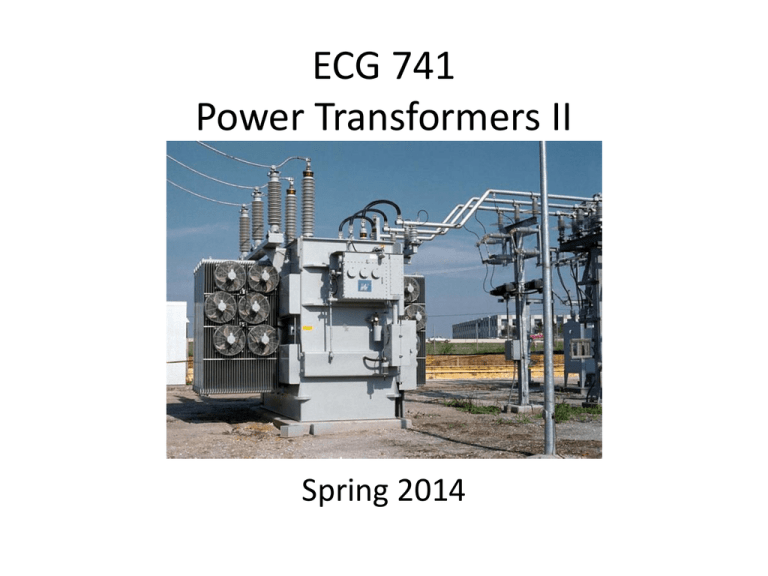
ECG 741 Power Transformers II Y. Baghzouz Spring 2014 Delta-Delta Connection Wye-Wye Transformer Connection 4. - connection: No phase shift, no problems with unbalanced loads or harmonics. Wye-Delta Transformer Connection Delta-Wye Transformer Connection Open-Delta Open-Delta Connection Capacity: 57.7% of Delta-Delta bank (not 66.7%) 3. -Y connection: The same advantages and the same phase shift as the Y- connection. Open-Wye Open-Delta Connection Example Primary Voltage: 13,200/7,620 V Secondary Voltage: 240 V Ia = 421 ∟-18o A Ib = 443 ∟-166o A Ic = 241∟83o A Sba = 101 kVA Scb = 57.8 kVA IA= 13.25 A IB = 7.58 A IN = 16.47 A Three-Phase Transformer (Delta-Delta) Three-Phase Transformer (Wye-Delta) Three-Phase Transformer (Wye-Wye) Example – Load Imbalance Substation Transformer Rating • 3 power ratings (e.g., 21/28/35 MVA) – OA: oil-immersed and self-cooled – FA: forced air cooled – FOA: forced oil cooled • Above the hot-spot temperature of 110oC, the life expectance decreases exponentially (it halves for every 8oC increase in temperature. • The transformer impedance is usually between 7%and 10% (based in OA rating) The Autotransformer Sometimes, it is desirable to change the voltage by a small amount (for instance, when the consumer is far away from the generator and it is needed to raise the voltage to compensate for voltage drops). In such situations, it would be expensive to wind a transformer with two windings of approximately equal number of turns. An autotransformer (a transformer with only one winding) is used instead. Diagrams of step-up and step-down autotransformers: Series winding Series winding Common winding Common winding Output (up) or input (down) voltage is a sum of voltages across common and series windings. The autotransformer Since the autotransformer’s coils are physically connected, a different terminology is used for autotransformers: The voltage across the common winding is called a common voltage VC, and the current through this coil is called a common current IC. The voltage across the series winding is called a series voltage VSE, and the current through that coil is called a series current ISE. The voltage and current on the low-voltage side are called VL and IL; the voltage and current on the high-voltage side are called VH and IH. For the autotransformers: VC NC VSE N SE NC IC N SE I SE NC VL VH NC N SE I L NC N SE IH NC The apparent power advantage The ratio of the apparent power in the primary and secondary of the autotransformer to the apparent power actually traveling through its windings is S IO N SE NC SW N SE The last equation described the apparent power rating advantage of an autotransformer over a conventional transformer. SW is the apparent power actually passing through the windings. The rest passes from primary to secondary parts without being coupled through the windings. Note that the smaller the series winding, the greater the advantage! The apparent power advantage For example, a 5 MVA autotransformer that connects a 110 kV system to a 138 kV system would have a turns ratio (common to series) 110:28. Such an autotransformer would actually have windings rated at: SW S IO N SE 28 5 1.015MVA N SE NC 28 110 Therefore, the autotransformer would have windings rated at slightly over 1 MVA instead of 5 MVA, which makes is 5 times smaller and, therefore, considerably less expensive. However, the construction of autotransformers is usually slightly different. In particular, the insulation on the smaller coil (the series winding) of the autotransformer is made as strong as the insulation on the larger coil to withstand the full output voltage. The primary disadvantage of an autotransformer is that there is a direct physical connection between its primary and secondary circuits. Therefore, the electrical isolation of two sides is lost. Chapter 3 Problems # 6, 8, 9, 10.
